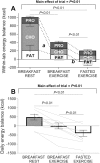Skipping Breakfast Before Exercise Creates a More Negative 24-hour Energy Balance: A Randomized Controlled Trial in Healthy Physically Active Young Men
- PMID: 31321428
- PMCID: PMC6675614
- DOI: 10.1093/jn/nxz018
Skipping Breakfast Before Exercise Creates a More Negative 24-hour Energy Balance: A Randomized Controlled Trial in Healthy Physically Active Young Men
Abstract
Background: At rest, omission of breakfast lowers daily energy intake, but also lowers energy expenditure, attenuating any effect on energy balance. The effect of breakfast omission on energy balance when exercise is prescribed is unclear.
Objectives: The aim of this study was to assess the effect on 24-h energy balance of omitting compared with consuming breakfast prior to exercise.
Methods: Twelve healthy physically active young men (age 23 ± 3 y, body mass index 23.6 ± 2.0 kg/m2) completed 3 trials in a randomized order (separated by >1 week): a breakfast of oats and milk (431 kcal; 65 g carbohydrate, 11 g fat, 19 g protein) followed by rest (BR); breakfast before exercise (BE; 60 min cycling at 50 % peak power output); and overnight fasting before exercise (FE). The 24-h energy intake was calculated based on the food consumed for breakfast, followed by an ad libitum lunch, snacks, and dinner. Indirect calorimetry with heart-rate accelerometry was used to measure substrate utilization and 24-h energy expenditure. A [6,6-2H2]glucose infusion was used to investigate tissue-specific carbohydrate utilization.
Results: The 24-h energy balance was -400 kcal (normalized 95% CI: -230, -571 kcal) for the FE trial; this was significantly lower than both the BR trial (492 kcal; normalized 95% CI: 332, 652 kcal) and the BE trial (7 kcal; normalized 95% CI: -153, 177 kcal; both P < 0.01 compared with FE). Plasma glucose utilization in FE (mainly representing liver glucose utilization) was positively correlated with energy intake compensation at lunch (r = 0.62, P = 0.03), suggesting liver carbohydrate plays a role in postexercise energy-balance regulation.
Conclusions: Neither exercise energy expenditure nor restricted energy intake via breakfast omission were completely compensated for postexercise. In healthy men, pre-exercise breakfast omission creates a more negative daily energy balance and could therefore be a useful strategy to induce a short-term energy deficit. This trial was registered at clinicaltrials.gov as NCT02258399.
Keywords: breakfast; carbohydrate; exercise; energy balance; fasting; metabolism; physical activity; substrate metabolism.
Copyright © American Society for Nutrition 2019.
Figures





Comment in
-
Does Hepatic Carbohydrate Availability Influence Postexercise Compensation in Energy Intake?J Nutr. 2019 Aug 1;149(8):1305-1306. doi: 10.1093/jn/nxz131. J Nutr. 2019. PMID: 31188453 No abstract available.
References
-
- Donnelly JE, Blair SN, Jakicic JM, Manore MM, Rankin JW, Smith BK. American College of Sports Medicine Position Stand. Appropriate physical activity intervention strategies for weight loss and prevention of weight regain for adults. Med Sci Sports Exerc. 2009;41:459–71. - PubMed
-
- King NA, Hopkins M, Caudwell P, Stubbs R, Blundell JE. Individual variability following 12 weeks of supervised exercise: identification and characterization of compensation for exercise-induced weight loss. Int J Obes. 2008;32:177–84. - PubMed
-
- Turner JE, Markovitch D, Betts JA, Thompson D. Nonprescribed physical activity energy expenditure is maintained with structured exercise and implicates a compensatory increase in energy intake. Am J Clin Nutr. 2010;92:1009–16. - PubMed
-
- Thompson D, Peacock OJ, Betts J. Substitution and compensation erode the energy deficit from exercise interventions. Med Sci Sports Exerc. 2014;46:423. - PubMed

